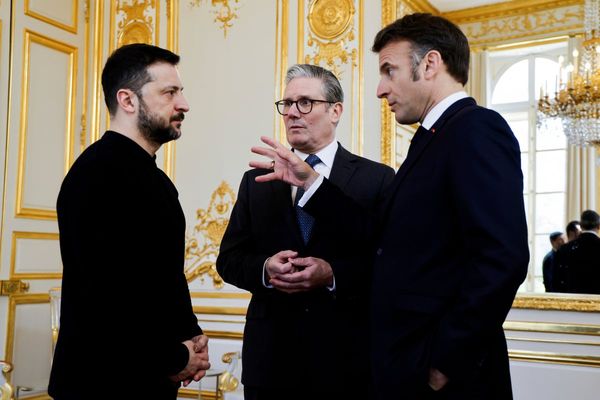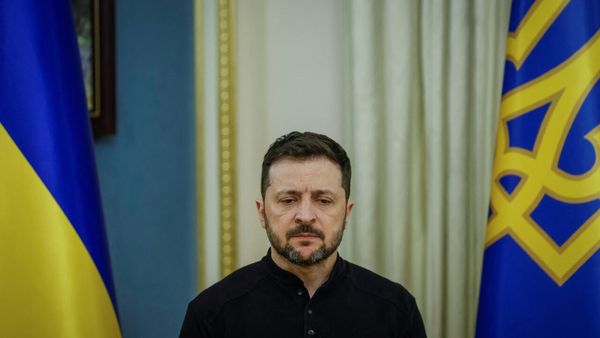
New Delhi, India – In the summer of 2018, three bodies were recovered from the Sabarmati River in Ahmedabad, a sprawling city in western India’s Gujarat state.
Two women – Asha Thakor, 30, and Bhavna Thakor, 28 – had died by suicide along with Asha’s three-year-old daughter. Before the two women jumped into the water, they left a message written in red lipstick on a wall along the riverfront.
“We are leaving the world which will never allow us to be one,” the inscription said in Gujarati language.
Both the women were married to men and had children. A police investigation later found they had met at a company where both of them worked. Their friendship soon turned into a relationship, causing frequent fights within their families.
They wanted to spend their lives together. But they had no social sanction or legal rights to do so.
Rohin Bhatt, 25, was a student at Gujarat’s National Law University when he read about the death of the two women. He said it shook his conscience.
Five years later, Bhatt was one of the key advocates petitioning for the legalisation of same-sex marriages before India’s Supreme Court, which last week refused to rule on the issue in what the LGBTQ community called a “heartbreaking setback”.
In its verdict, a five-judge bench headed by Chief Justice DY Chandrachud recognised that the LGBTQ community faces discrimination from the state but declined to get into “judicial lawmaking” on same-sex marriage, saying such a decision fell outside its purview and should be addressed by the Indian Parliament. It also ruled against granting adoption rights to unmarried gay couples.

‘Government hostile to queer rights’
The ruling was a setback for India’s LGBTQ community. Many had expected the Supreme Court to grant them the right to marry their partners.
“We have been told that we don’t deserve equal rights. We cannot marry. The buck has been passed to the government, which is hostile to queer rights,” Bhatt told Al Jazeera. “This judgement not only affects me as a lawyer but also as a subject matter, a queer person myself.”
Bhatt and his partner, who did not want to reveal his identity, met on Twitter, now X, last year.
“It was love at first sight. We do want to get married, but we are stuck in a limbo,” he told Al Jazeera.
“Now everything is going to be affected. It isn’t merely about marriage. It’s about a plethora of rights that emerge from recognition. Today we are stared at, discriminated against. People talk rubbish to us. Many lawyers argued these facets of discrimination before the court. But the court turned its back on us.”

Homosexuality was criminalised in India under Section 377 of the Indian Penal Code, a law inherited from the British, who ruled over the subcontinent until 1947.
In 2001, the Naz Foundation, an organisation that works on HIV/AIDS and sexual health, approached the Delhi High Court, seeking decriminalisation of consensual homosexual sex between adults. The court in 2009 ruled that Section 377 was a violation of fundamental rights.
However, the Supreme Court in 2012 overturned the Delhi High Court’s order, delivering a big blow to the LGBTQ community.
Two years later, the top court recognised the rights of transgender people when it affirmed the legal recognition of a third gender. Eventually, in 2018, a landmark year for queer rights in India, the court decriminalised homosexuality by striking down provisions of Section 377.
But in its opposition to same-sex marriages, Prime Minister Narendra Modi’s government argued before the top court that the call for marriage equality was an “urban elitist” concept that should not be deliberated by a court of law.
The government said same-sex marriages were not “comparable with the Indian family unit concept of a husband, a wife and children”.
Minutes after the Supreme Court verdict, Sunil Ambekar, publicity incharge of Rashtriya Swayamsevak Sangh (RSS), the ideological fountainhead of Modi’s BJP, welcomed the decision on social media.
The Vishwa Hindu Parishad (VHP), another far-right Hindu group, said it was “satisfied” with the court saying marriage between two homosexuals was not eligible for registration.
“This is not even their fundamental right. Not giving homosexuals the right to adopt a child is also a good step,” said the VHP statement.
‘Our fight has just gotten harder’
Pooja Kumari, whose name has been changed for fear of reprisals at work, is a 25-year-old from the Bhiwani district in the northern state of Haryana. She told Al Jazeera it is difficult to be in a same-sex relationship in India, especially in villages.
“You cannot even imagine how difficult it is to explain to people why I am like this. People in villages only know one thing: Women and men get married and bear children. My experience is non-existent for them,” she said.
Kumari lives away from her family in a city in western India.
“My elder sister, who is educated, has a slight idea about my orientation. My family has told me that I am a woman, and I will have to get married to a man. They receive proposals for my marriage. What can I tell them? No one supports me. I only get support from my own community of lesbian, gay and trans folks,” she said.

One of the cases Bhatt had included in his petition before the Supreme Court was related to Nitin Karani, a 52-year-old bank executive in Mumbai.
Karani married Thomas Joseph, a consultant in New York in 2019. In their plea, they had asked for legal recognition of their marriage in India or permission to remarry under the Special Marriages Act, a 1954 law that allows Indians belonging to different religions or castes to marry.
But the Supreme Court said it can’t make a law, “only interpret it and give effect to it”.
“If the court reads down or inserts words into the Special Marriage Act to give marriage rights to LGBTQIA+ community members, then it would be entering into the legislative domain,” it said in its judgement.
Members of the LGBTQ community now feel they have been “left at the mercy” of Modi’s ruling BJP.
“Everyone knows the government is not interested in granting us these rights. They have not even set up a committee yet. Can we have any hope?” Karani said.
Anish Gawande is a 27-year-old activist who runs Pink List India, which maps the initiatives India’s politicians have taken towards the LGBTQ community.
“Honestly, our fight has just gotten harder. There is certainly a lack of clarity on what the next steps are. Which doors do we knock on now? The court has not done enough. We were expecting bread. They have not even given us breadcrumbs,” he said.
“One must understand that the right to marriage comes with a bouquet of other rights. Marriage extends protection to queer couples from hostile families and police harassment. Marriage is not merely social recognition. It is also protection from violence to the most vulnerable. Denial of this protection is a much bigger issue, which impacts the most marginalised.”
Rituparnah Borah, who runs Nazariya, a queer feminist resource group, and one of the petitioners before the Supreme Court, told Al Jazeera that LGBTQ rights “do not start or end with marriage”.
“Marriage is not the end goal. Protection from violence is. … What we need is an anti-discrimination law,” she said.
“Our petition was not merely about marriage. It was also about family violence inflicted upon queer people. Marriage will not solve all our problems unless there is an anti-discrimination and protection law which shelters us.”
A day after the Supreme Court’s judgement, lawyer Utkarsh Saxena and PhD scholar Ananya Kotia went to the Supreme Court complex in New Delhi and exchanged rings. Kotia uploaded a photo of Saxena on his knee, giving him the ring.
“Yesterday hurt. Today, Utkarsh Saxena and I went back to the court that denied our rights and exchanged rings. So this week wasn’t about a legal loss, but our engagement,” said the caption with the photo.
“We’ll return to fight another day”.







